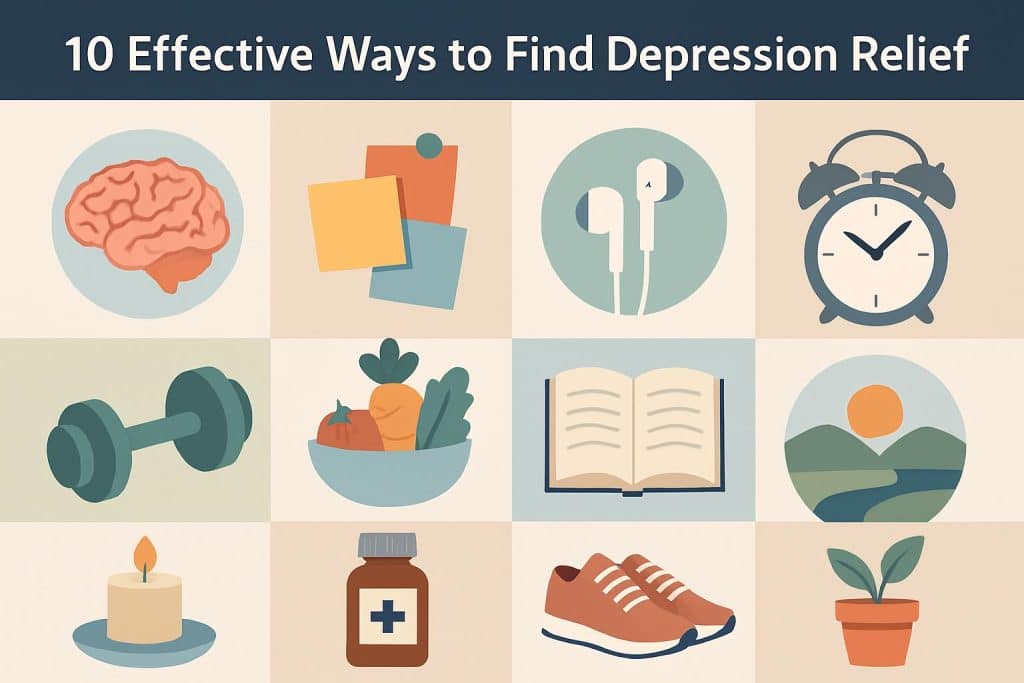When you’re struggling with feelings of sadness, fatigue, or loss of interest in things you once enjoyed, it can feel like there’s no way out. But depression relief is possible. Healing takes time, patience, and support. With the right care and small, steady steps, it’s possible to find balance again and strengthen your mental well-being.
Depression relief doesn’t come from a single action. It often comes from a collection of small, steady steps: seeking help, rebuilding daily rhythms, and reconnecting with what brings meaning. If you or someone you love is navigating mental health depression, here are ten ways to begin the process of healing with understanding and compassion.
1. Start by Understanding What You’re Feeling
The first step to feeling better is understanding what you’re going through. Depression signs and symptoms can include:
- Persistent sadness or emptiness
- Difficulty sleeping or oversleeping
- Changes in appetite
- Low energy or motivation
- Loss of interest in daily activities
Recognizing these signs allows you to reach out for help early, and that can make a big difference.
2. Seek Professional Support
You don’t have to go through this alone. Speaking with a therapist, psychologist, or psychiatrist can help you better understand what’s happening and learn coping strategies that work for you. Therapy is not a sign of weakness, it’s a sign of courage and self-care. Sometimes, medication can also be an important part of depression relief when prescribed by a mental health professional.
3. Stay Connected
Depression can make you want to withdraw, but connection is often a vital part of healing. Reach out to friends, family, or support groups. Even a simple message or conversation can remind you that you’re not alone in how you feel. It’s okay to lean on others.
4. Rebuild routine
Depression can disrupt the natural rhythm of life: sleep, meals, motivation. Structure helps restore balance, even in small ways.
Start with simple goals:
- Wake up at a consistent time
- Eat one nourishing meal at a set hour
- Step outside, even for a few minutes
Having a routine can help restore a sense of stability and purpose when you need it most.
5. Prioritize Rest and Sleep
Depression can disrupt your sleep, and poor rest can make symptoms worse. Try following these mental health tips for depression:
- Maintain a consistent bedtime and wake-up time
- Keep your room cool, dark, and quiet
- Avoid screens an hour before bed
6. Move at Your Own Pace
Exercise can help lift your mood, but it doesn’t have to mean intense workouts. Gentle activities like stretching, yoga, or a walk in nature can improve energy levels and emotional balance. Move in ways that feel right for you. No pressure, no rush.
7. Practice Mindfulness and Self-Compassion
When your thoughts feel heavy, mindfulness can help you find calm. Take a few moments to breathe deeply, focus on the present, or write down what you’re feeling. Try to replace self-criticism with kindness. Speak to yourself the way you would to someone you love.
8. Nourish from Within
Food doesn’t cure depression, but it can support recovery. Eating regularly and choosing balanced meals can help stabilize energy and mood.
Focus on:
- Whole foods like fruits, vegetables, grains, and lean proteins
- Omega-3-rich foods like fish and flaxseeds
- Staying hydrated throughout the day
9. Limit What Drains You
It can be tempting to cope with pain through alcohol, caffeine, or social media—but these can often deepen fatigue and anxiety. Try replacing them with small acts that soothe, like reading, journaling, breathing fresh air, or listening to calming music.
Healing often means creating space for what nourishes you and gently letting go of what doesn’t.
10. Do More of What Brings You Joy
Even when things feel difficult, moments of joy and meaning can help you reconnect with yourself. Read a book, paint, cook a favourite meal, or help someone in need. These small acts can slowly bring light into dark days.
When to Seek Immediate Help
If you or someone you know feels hopeless or has thoughts of self-harm, please reach out for help right away. You are not alone, and support is available. A list of Helplines are available on our website along with a list of verified mental health professionals.
Depression can feel like a long and uncertain journey, but you are not defined by it. Healing doesn’t happen overnight, and that’s okay. Every act of care, every conversation, every small step matters. With support, compassion, and time, depression relief is possible, and so is hope.
